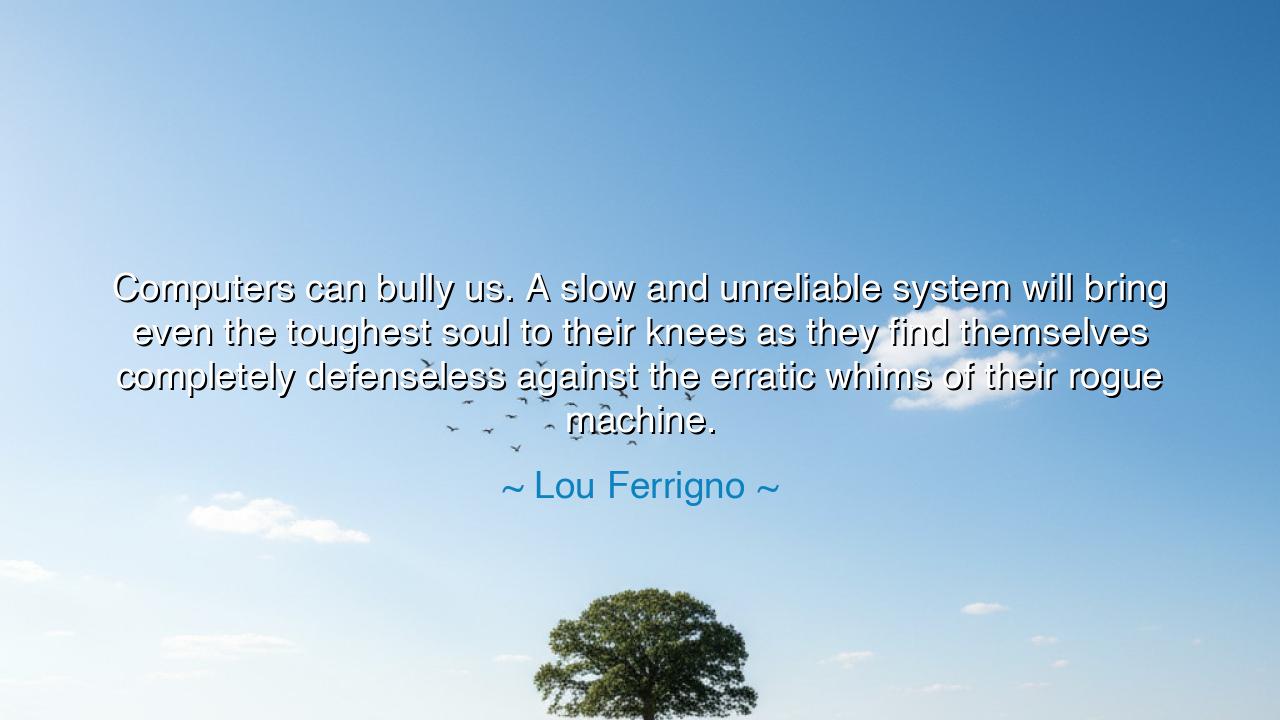
Computers can bully us. A slow and unreliable system will bring
Computers can bully us. A slow and unreliable system will bring even the toughest soul to their knees as they find themselves completely defenseless against the erratic whims of their rogue machine.






"Computers can bully us. A slow and unreliable system will bring even the toughest soul to their knees as they find themselves completely defenseless against the erratic whims of their rogue machine." – Lou Ferrigno
In the ever-evolving world of technology, the machine—once a humble servant to mankind—has slowly transformed into an entity of its own, capable of exerting a strange, unyielding force over the human spirit. Lou Ferrigno's words are a stark reminder of the paradox we face in the modern age: while we have created machines to serve our will, we have become vulnerable to their whims. The computer, once a tool of immense power, can now become a bully—a force that overwhelms the most resilient soul, breaking them down with its slow, unpredictable nature. It is in these moments, when we are completely defenseless against the erratic behavior of the machine, that we are reminded of the limits of our own control and the unexpected power of the things we create.
Consider the ancient gods and their ability to both create and destroy. The gods were often seen as powerful forces, wielding not just creation, but also the ability to manipulate the lives of mortals with a simple whim. Ferrigno's description of computers mirrors this ancient view: the machine, once a source of order and structure, now becomes capricious, unpredictable, and powerful enough to turn its creators into helpless victims. Just as the gods in ancient myths could turn against the humans who worshipped them, so too can the machines we build shift from servants to tyrants, leaving us at their mercy when they malfunction or behave erratically.
The role of technology in our lives is akin to the tale of Prometheus, who gifted fire to humanity, thus providing the potential for both progress and destruction. With fire, humanity created civilizations, but it also brought with it the danger of consuming flames that could destroy. Similarly, the computer, that marvelous creation, has the power to enhance our lives in ways unimaginable to earlier generations. Yet, when the system fails or behaves unpredictably, we are left at the mercy of our creation. This vulnerability, this dependence, reveals a deeper truth: that no matter how advanced we become, there is always something that lies beyond our full control. Computers, like fire, are forces that can uplift or tear us down, depending on how we wield them.
One cannot help but think of the story of King Midas, who, in his quest for wealth, was granted the ability to turn everything he touched into gold. Initially, this gift seemed like the greatest blessing, but it soon turned into a curse when everything—even his food and loved ones—became golden and thus out of reach. The same is true for technology: it offers us immense power and convenience, but when it turns against us, when a slow and unreliable system traps us in frustration, we find ourselves at the mercy of the very thing we sought to control. It is in these moments of helplessness that we learn the fragility of our creations and the humbling realization that we cannot always bend the world to our will.
Consider the real-world example of the early days of computing, when systems would crash unexpectedly, leading to frustration and helplessness for those who relied on them for vital work. Even today, a simple computer freeze can lead to hours of wasted time, productivity lost, and an emotional toll on those who depend on technology to fulfill their daily tasks. In these moments, we feel the weight of Ferrigno’s words—vulnerable to the whims of the machine, struggling against something we cannot control. It is a stark reminder of how reliance on technology can render us powerless, stripping us of the autonomy we once held over our own work.
The lesson we must learn from Ferrigno’s insight is that technology, though a powerful tool, is still ultimately a creation of man—imperfect, unpredictable, and at times beyond our control. We must approach our relationship with technology with humility and awareness, recognizing that it is a tool that can empower or undermine us. Dependence on technology without understanding its limitations will inevitably lead to frustration and helplessness. In these moments, we are reminded of the ancient wisdom that true strength lies not in the machines we create, but in our resilience—our ability to adapt, to learn, and to find new ways to regain control.
As we continue to build increasingly complex and powerful systems, let us remember that the greatest power lies not in the machines themselves, but in our ability to adapt to their unpredictable nature. We must strive for balance: using technology to enhance our lives, while also nurturing the human qualities that allow us to endure when the systems fail. Let us approach our creations with both confidence and respect, knowing that they are only tools—tools that can serve us when used wisely, but that can also overwhelm us if we allow them to. And in those moments when the system falters, let us not bow to the bullying whims of the machine, but instead rise, stronger and more resilient, in our ability to overcome its challenges.






AAdministratorAdministrator
Welcome, honored guests. Please leave a comment, we will respond soon